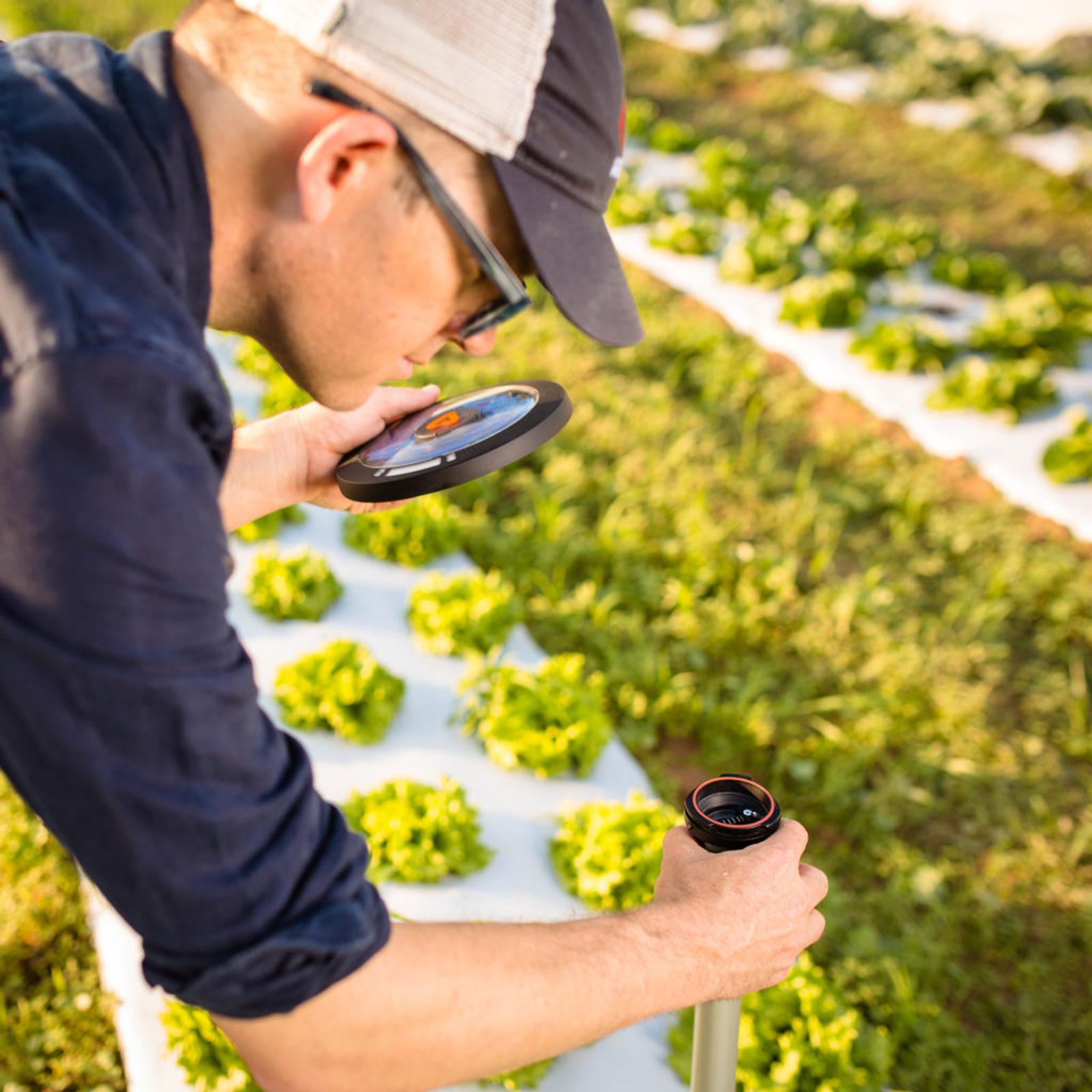Empowering Agribusiness to Handle Environmental Uncertainty

With Sensor-Based Feedback Loops, Arable Empowers Agribusinesses in 14+ Countries to Handle Environmental Uncertainty
With Sensor-Based Feedback Loops, Arable Empowers Agribusinesses in 14+ Countries
Arable Labs produces smart, connected devices to enable independent farmers, commercial agribusinesses, and government organizations to collect data on crops and climates. Arable devices can capture data ranging from routine weather to advanced plant monitors, which can be used to predict disease, water and nutrient needs, and even future crop yield. With this information, the company can run predictive analytics that keep producers informed and prepared.

Uncertainty is the New Norm in the Global Agriculture Sector
From coffee growers in South America to spice growers in Southeast Asia, agribusinesses small and large face the same challenges; unpredictable changes in weather that drives plant stress and disease. A monsoon that arrives sooner than expected or a disease outbreak can reduce the yield of an entire crop for that season—which can cost millions of dollars in lost revenue for everyone in the supply chain.
Additionally, the majority of farms are rural, and up-to-date weather data is extremely scarce. Any connected technology solutions should be low-cost and able to reliably connect to the cloud through a cellular network—rather than WiFi or Bluetooth, which isn’t accessible in most rural areas. “We see our technology as critical to the $7.8 trillion food and agriculture industry,” says Bollinger. “Large agribusinesses risk wasting billions of dollars due to water related risk exposure in terms of sustainably producing raw materials in the next 5 to 10 years. Our technology helps agribusinesses, large and small, navigate potential change in delivering what it takes to feed a growing population, especially in the context of climate change.”
How Arable and Hologram Make Farmers More Agile—Saving Crops as a Result
Through their partnership with Hologram, Arable Labs is able to provide connected devices to small and large agribusinesses all over the world. Arable Labs’ devices are powered by Hologram’s global IoT SIM cards that connect to their software-defined global cellular network. Users can set up their system and start accessing data as soon as they take their devices out of the box.
“With information at their fingertips, farmers can scenario plan more efficiently,” says Bollinger. “They can plan ahead and manage resources more effectively. Commercial agriculture businesses can prevent the loss of millions of dollars. Independent farmers can preserve their livelihoods and communicate directly with their consumers. Food supplies remain protected. In places where weather data is scarce, either because poor satellites data, or lack of weather stations in a radius that would be meaningful, we’re able to over a low-cost solution that could easily go into the farms, connect reliably to the cloud, and share weather data with local communities for multiple purposes.”
Expanding Access to Connectivity Through a Simple, Global SIM
Hologram’s global network and cellular-connected devices ensure that even the most rural farming communities have access to real-time data that captures the climate, weather, crop health and yields. With this data, farmers and their local communities have access to predictive analytics that can save them thousands to millions of dollars. Through the partnership with Hologram, Arable Labs has been able to ship 450 Marks to 14 different countries, across six continents (and have a promising lead in Antarctica) in their first season!
Hologram’s ready-to-use global SIMs helped Arable expedite its time to market and scale with precision—on an aggressive timeline.
With the ability to provide highly detailed data analytics by crop and region using connected devices, Arable Labs plans to continue to scale their offerings to agribusinesses worldwide.
“Whether you speak to the person in charge of irrigation management, procurement strategy, or data integration or even running the business, and then look across all the different crops in all different regions, the number of challenges faced by agribusinesses are really diverse,” explains Bollinger.
“For us, it’s being able to provide those very specific recommendations, by crop, by region. What’s great is our models are informed by the rich data that we're collecting on the ground. The information is fine-tuned to apply to in-field weather scenarios and the specific sensitivities of the crop, which is different than most models folks have been looking at in the past. Our solution goes the extra step in tailoring the analytics, allowing the different end-user within the organization to use the data effectively for decision-management.”
With Arable, farmers and commercial agriculture businesses can pivot with precision.
“Anyone operating a center pivot can use our device to predict rainfall amounts for their field relative to crop water stress levels. This empowers growers to shut o irrigation without negatively impacting their yield goals, potentially saving $500-$1,000 in water and energy costs immediately, which pretty much pays for the device itself. This figure scales across entire supply chains for agribusinesses. Adverse weather conditions lead to raw material supply shocks.
Building the Future of a Resilient Food Supply Chain
Hyper-local yield forecasting on changing situations is important for pricing strategy and resource planning.
Arable examined Cyclone Enawo in Madagascar this year and its impact to vanilla production, the vineyards in Napa affected by the fires, coffee leaf rust outbreak in the past.
Having information about the timing and magnitude of the potential impact is critical for effective management. There are a number of rapid onset disturbances that will impact supply, as well as slow onset risks that will reveal future vulnerabilities.
“We’ve heard about beer companies losing $2M in revenue due to protracted drought. Agriculture in California is a $45B industry, and in this season alone we saw record rainfall (90 inches!) and record high temperatures,” says Bollinger. “Access to accurate and reliable data is the key to understanding shocks and mitigating risk, in order to build a more resilient global food system.”